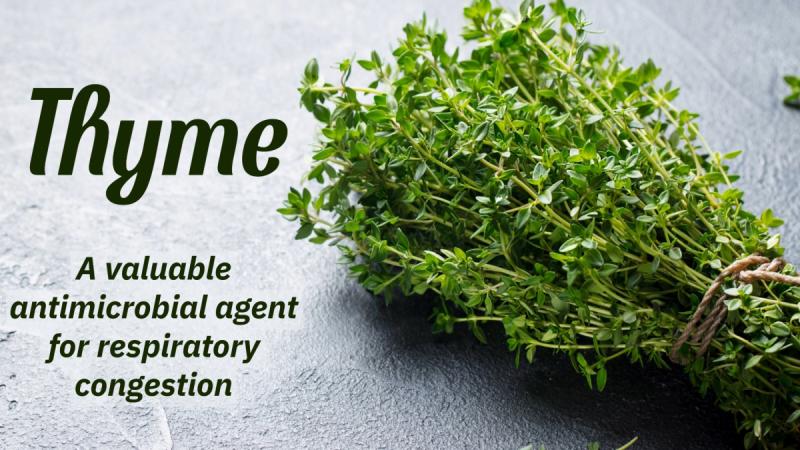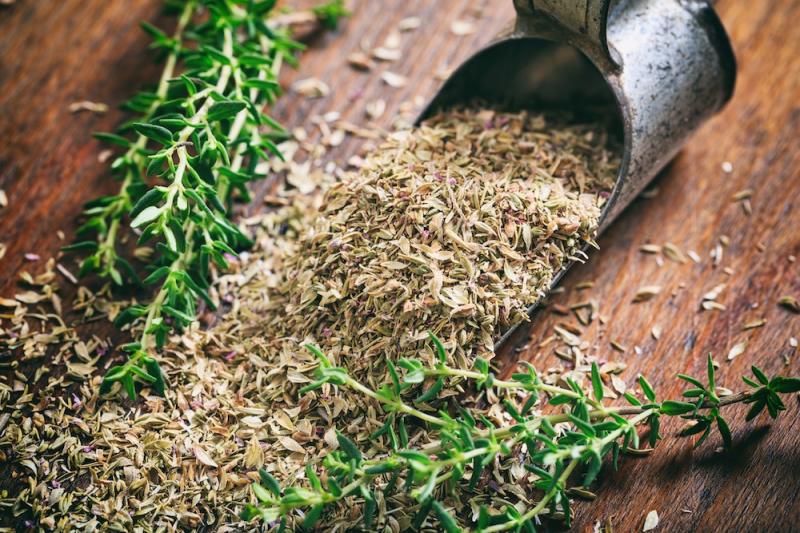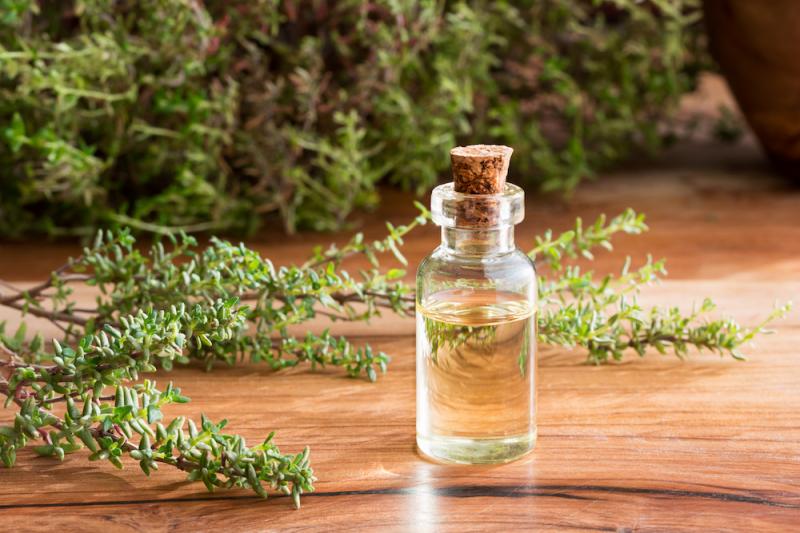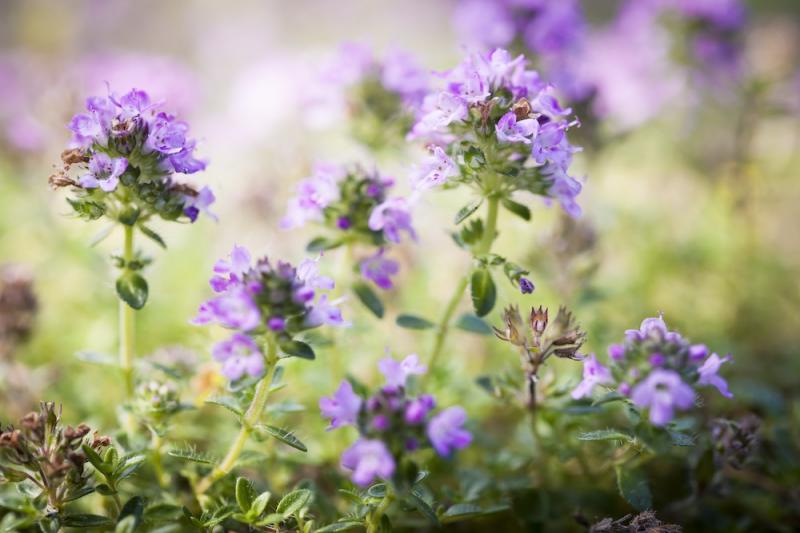
Whenever I think of the herb thyme, the line, “Parsley, sage, rosemary, and thyme,” from Simon and Garfunkel’s rendition of Scarborough Fair plays in my head. For some reason this only happens with thyme and not the other three herbs mentioned. And while it is commonly found in the kitchen, thyme has several medicinal properties and historical uses that are worth knowing. It also has some energetic properties we'll get to later.
It's About Thyme
 Thymus vulgaris is one of the herbs native to the Mediterranean region. It’s an aromatic, with a slightly pungent quality. In my mind, it has two primary uses.
Thymus vulgaris is one of the herbs native to the Mediterranean region. It’s an aromatic, with a slightly pungent quality. In my mind, it has two primary uses.
First, it’s a fairly strong antimicrobial remedy, due to the properties of its essential oil. The oil contains thymol, which has antibacterial and disinfectant qualities. Since essential oils evaporate as a plant is dried, ground, and stored, the fresh plant or the essential oil will have the highest antimicrobial activity.
Second, thyme is also helpful for respiratory ailments. It’s both an expectorant and an antispasmodic, so it helps to loosen and expel mucus while relaxing bronchial spasms. It can be used for problems like bronchitis, whooping cough, and asthma to both clear mucus and relax the respiratory passages to make breathing easier. According to David Winston, it also works well for problems like COPD and emphysema when combined with wild cherry bark and licorice root.
This makes thyme a good ingredient in cough syrups, especially those targeted at spastic coughs associated with whooping cough and bronchitis. It will help fight infection, expel excess mucus, and ease breathing. Thyme is also a good oil to use as an inhalant for respiratory problems. You can sniff the essential oil directly out of the bottle or add it to hot water and inhale the steam.
Thyme has other uses of course, such as stimulating digestion and reducing intestinal dysbiosis. It stimulates circulation and may also have some anti-aging effects like sage and rosemary.
Thyme Essential Oil
 Thyme is quite a complex fragrance. It has a vaporous, turpentine-like quality so it helps to open up air passages like pine or eucalyptus, but it’s more pungent, so it has a “hotter” quality to it, but it also has woody and herbaceous notes. It is stimulating to the mind, but also has a grounded quality so that it helps with mental focus and taking action on one’s ideas.
Thyme is quite a complex fragrance. It has a vaporous, turpentine-like quality so it helps to open up air passages like pine or eucalyptus, but it’s more pungent, so it has a “hotter” quality to it, but it also has woody and herbaceous notes. It is stimulating to the mind, but also has a grounded quality so that it helps with mental focus and taking action on one’s ideas.
The best way to get the antiseptic benefits of thyme is to use the essential oil. Thyme essential oil can be used in mouthwashes, gargles, disinfectant hand soaps, lotions, or salves to help fight various types of infections. It is antibacterial and antifungal and also has some antiviral activity. For example, it has been used to help fight both type one and type two herpes. Thyme oil may also be applied topically to relieve insect bites and stings.
Thyme, Courage, and the Thymus
Now that we’ve covered the physical applications of thyme, let’s get into it’s energetics. When I think of the energetics of thyme I think of Jack Ritchason’s saying, “thyme is for the thymus.” The thymus energy center, in my emotional healing model, is located above the right breast and is the judgment center of the body. It is also the center for self-esteem, how we view ourselves, which is associated with what we put after the phrase “I am…” This energy center regulates both immunity and our sense of good judgment in life.
Thyme has long been associated with courage. In fact the name thyme may come from the Greek thumus, meaning courage. It has long been used to dispel feelings of discouragement and aid feelings of fortitude and vigor. Having a positive attitude about oneself is linked to having a stronger immune system, while a poor self-image can weaken the immune system. I’ve found that if we don’t feel like we’re worth protecting emotionally, it signals the immune system that we’re not worth defending physically.
A key component of immunity is the ability to recognize what is good for us and not good for us and to choose what is good for us. So, I believe that both thyme essential oil and the flower essence of thyme strengthen this healthy sense of ego or self-esteem necessary for proper immune responses.
Thyme, Time, and Good Judgment
 Thyme can be pronounced “time” which creates another useful energetic association. The thymus energy center is also associated with developing a sense of good judgment. Judgment helps us organize our lives and our priorities to serve our needs and goals properly. A person who suffers from a poor self-image often struggles with organization, including time management. And those who have this problem may also benefit from thyme.
Thyme can be pronounced “time” which creates another useful energetic association. The thymus energy center is also associated with developing a sense of good judgment. Judgment helps us organize our lives and our priorities to serve our needs and goals properly. A person who suffers from a poor self-image often struggles with organization, including time management. And those who have this problem may also benefit from thyme.
In Anne McIntyre’s book, Flower Power, she suggests that a flower essence of thyme may help those who struggle with time. They’re stressed by deadlines or are always trying to “beat the clock.” There’s also a sense of timing in life, when it’s appropriate to do something and when it’s not, which is also part of having good judgment. So, by supporting the thymus energy center, thyme essential oil or flower essence may help people better organize their time and energy.
Using Thyme
Thyme is pretty easy to grow in your garden so you can use it fresh to make a tea which is useful for respiratory congestion and stomach distress. You can also make a tincture and use 10-80 drops several times a day. I’ve also made thyme into a glycerite. You can also use it as an ingredient in formulas for the immune and respiratory systems.
When using the essential oil, you need to dilute it as it’s quite strong. Mix it with a fixed oil like olive oil or coconut in a 1:20 dilution (1 drop essential oil for 20 drops fixed oil) for topical application to wounds and skin infections. For internal use mix 1-2 drops of the essential oil into a tablespoon of fixed oil or honey and take once or twice daily for a maximum of two weeks. You can also diffuse the oil to prevent the spread of infection or inhale it directly from the bottle or in steam to ease respiratory problems.
The herb is very safe in normal therapeutic doses like those described above. However, the essential oil can be irritating and should be diluted for both internal and topical use as described above.
Steven's Articles
-

-
Teasel
A traditional herb for healing injured bones and…
-

-
Barberry and Healthy Personal Boundaries
A thorny shrub for fighting infections and supporting…
December
-

-
The Evidence for Berberine
A yellow alkaloid found in traditional infection-fighting…
-

-
The Sensible Use of Caffeinated Herbs
Kola nuts, guarana, and yerba mate and other herbs…
-

-
The Health Benefits and Problems with Coffee
This popular caffeinated beverage can be beneficial…
October
-

-
Understanding Caffeine & Cellular Adaptation
Preserving the power of caffeine's buzz and the…
September
-

-
Horseradish
A pungent spice for aiding protein metabolism…
-

-
Banaba or Crepe Myrtle
A beautiful tree from Southeast Asia whose leaves…
August
-

-
Monkeyflowers
Flower essences to help see ourselves more clearly…
-

-
Mariposa Lilies
Strengthening the bond between mother and child…
-

-
The Noble Bay Leaf
A common kitchen herb for aiding digestion and…
-

-
Epimedium: Horny Goat Weed
A circulatory stimulant and kidney yang tonic…
July
-

-
The Medicinal and Nutritional Benefits of Apricots
A nutritious fruit and valuable medicinal seed for coughs
-

-
Dogwoods
Asian dogwood is used to stop excessive discharge,…
June
-

-
Neem: The Village Pharmacy
A popular Ayurvedic remedy for dental and immune…

